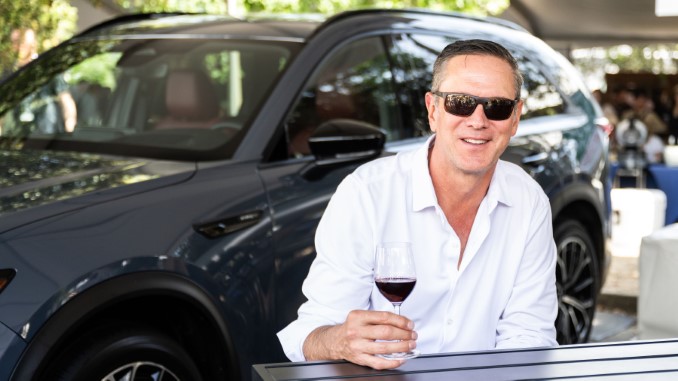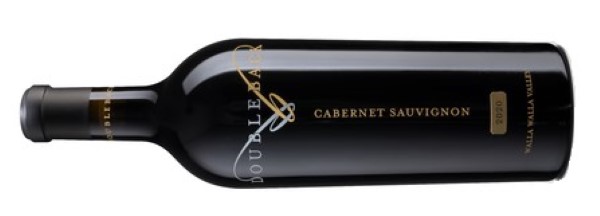NFL Legend/Vintner Drew Bledsoe on the Challenges Facing the American Wine Industry
Photo courtesy Gamma Nine Photography, Marc Fiorito
Basking in the picture-perfect late spring glow of Sonoma County as an attendee of the recent Healdsburg Wine & Food Experience, it was difficult to imagine in that moment that the winemakers around me on all sides might be consumed by existential anxiety for their businesses or livelihoods. We were, after all, inundated with wine geeks and aficionados from all over the world, rabid supporters of small and independent vineyards, the kinds of passionate consumers that help instill dreams of making your own wine in the first place. Going from stand to stand, sampling some of the best wines California had to offer, the very real struggles facing the American (and worldwide, really) wine industry seemed quite far away.
But for Drew Bledsoe, those thoughts are never really too far from mind–he can’t afford for them to be. The 14-year NFL veteran and former New England Patriots quarterback made a notable lateral transition to the world of wine way back in 2007, just a year after he hung up his cleats. Returning to his hometown of Walla Walla, Washington, his immediate family established Doubleback Winery and then eventually Bledsoe Family Winery, in an effort to both explore the wine terroir of the Walla Walla region and reconnect with the land itself. Starting with vintages of Cabernet Sauvignon and more recently venturing into well-received expressions of varietals such as Pinot Noir and Syrah, Bledsoe’s wine has won widespread acclaim. At the same time, he’s also partnered with carmaker Mazda–a sponsor of the Healdsburg Wine & Food Experience–to enhance the next era of each company.
While attending the festival I was able to sit down with Bledsoe, joined by Mazda CMO Brad Audet, for a conversation on the current state of the wine industry, slumping U.S. wine sales, and how his companies have managed to persevere for almost two decades while also growing the oenophile profile of Walla Walla and beyond.
Paste: Drew, I feel like people should first know that you are definitely no Johnny-come-lately to the American wine world. You’ve been doing this with passion for almost 20 years now.
Drew Bledsoe: Well, we started in the real way; we started with dirt. Got out with our kids, put vines in the ground with our own hands, in my home town of Walla Walla. I grew up there, got to go live out my childhood dream in the NFL and then doubled back and came back home. That’s where the Doubleback name comes from.

Paste: You’ve been in the game long enough to see the maturation of the American wine scene, and its plateauing in the last couple of years. In that time, how do you feel people’s perception of the Walla Walla region has evolved?
Bledsoe: We’re still young, honestly. Awareness outside of the northwest of what’s happening in Walla Walla is still low, which we view as blue sky for us. We really feel like, setting price aside, the quality is on par with any great wine region in the world. And then when you put the value proposition into it, you can drink amazing wine from Walla Walla and you don’t have to put $600 bucks into it. So we really feel like that is an advantage for us.
In terms of wine as a beverage plateauing, that is definitely happening, no one can deny that at this point. What that is forcing us to do, and forcing our industry to do, is to be better. If we’re going to stand out from the crowd in a very, very competitive market and potentially in a down economy, we have to be good at every last piece of what we do.
Paste: In the last year in particular, have you felt the pinch that other companies have been feeling?
Bledsoe: Oh yes, definitely. We’re still growing, we’re defying gravity as a business, but it’s required continued excellence in every piece of the business. And it helps that we’ve never fully grown into our demand. But this has been on the horizon for a while.
Paste: It feels like a lot of people continued to take the idea of perpetual growth for granted, even as things slowed down.
Bledsoe: That’s 100% true. Thankfully I’m old enough to still remember ‘07, ‘08, ‘09. That stuck in my mind, so we always knew there was going to be a downturn at some point. We’ve had this action plan in place the entire time, and now we’re executing on it. We certainly don’t expect these challenges to be over any time soon.
Paste: How do you build a company culture that reflects your values?
Bledsoe: For us, a big part of our story in addition to it being my hometown, which is obviously important to me, is how we treat the land and how we treat our people. We don’t have contract laborers; we have our own farming company, employing people year round. They have health benefits, they have retirement benefits. And because of that, you get that next-level attention to detail in the vineyard, because these people don’t have to worry about how they’re going to feed their families in the winter months. That part, although it was a financial sacrifice at the start, has been really foundational to our business. We have a long-term perspective, in wine–it’s not about what you did this month, or this quarter, but what you’re building for the next 20 years.
Paste: Okay, so in the next 20 years where would you like to see Bledsoe Family Winery and Doubleback?
Bledsoe: I think we’re kind of right-sized at the moment, to be honest with you. We’re making enough wine and doing well enough that we can employ 70 people. The business is self-sustaining; I don’t have to throw dollars at it. It helps that we’re not aspiring to make 100,000 cases of wine. We just want to be a right-sized business that can stay passionate about what we’re doing and over-deliver at every price point. It’s incremental growth now.
Paste: What percentage of the business is direct online sales, these days?
Bledsoe: Just a little bit less than 85% is direct to consumer. That really allows a small business to be a real business. Cutting out two levels of middlemen is huge for wineries like ours. If we did push everything out through distribution, we probably would have to make 100,000 cases of wine to be profitable.
Paste: How do you feel the partnership between Mazda and Bledsoe Family Winery reflects each company’s values?
Brad Audet: Well, we see ourselves at Mazda as a “crafted brand.” And I think there’s a lot of commonality between crafted vehicles, crafted products, and wine craftsmanship. And so, when we reached out to create a relationship with Drew, it wasn’t really about his specific wine range, or Drew the football player, it was about Drew the winemaker and his commitment to creating an extraordinary product that captured people’s imaginations. And I think as we’ve talked about our opportunities together, we’ve learned that we share some common principles and values as companies. We believe that our company and brand mindset is built around this concept of omotenashi, which is sort of the idea that “your happiness is my happiness.” And when you look at the mission statement of Drew’s company, they don’t even talk specifically about making extraordinary wine; what they talk about is manufacturing happiness and creating emotion in people. We thought that would be compelling to the people we’re trying to reach, and we remain so impressed with what a job Drew has done after leaving the football field and transitioning into a completely different business.
Bledsoe: It’s been interesting to discover the values we share in common, our demand for precision in what we do, in everything we do. Like Brad said, it’s about creating emotion, I think that’s what creates a loyal customer base. You can’t just make good juice and put it out on the market; that’s not enough. That doesn’t fly anymore. We have to be better than that.
Jim Vorel is a Paste staff writer and resident brown liquor geek. You can follow him on Twitter for more drink writing.